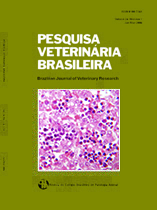 |
|
|
|
Year 2015 - Volume 35, Number 11
|

|
Immunodetection of myeloid and plasmacytoid dendritic cells in mammary carcinomas of female dogs, 35(11):906-912
|
ABSTRACT.- Rosolem M.C., Vasconcelos R.O., Garrido E., Castanheira T.L.L., Moreira P.R.R., Magalhães G.M., Rozza D.B. & Ramos S.B. 2015. Immunodetection of myeloid and plasmacytoid dendritic cells in mammary carcinomas of female dogs. Pesquisa Veterinária Brasileira 35(11):906-912. Departamento de Patologia Veterinária, Faculdade de Ciências Agrárias e Veterinárias, Universidade Estadual Paulista “Júlio de Mesquita Filho”, Campus de Jaboticabal, Via de Acesso Prof. Paulo Donato Castellane s/n, Jaboticabal, SP 14884-900, Brazil. E-mail: rosevasc@fcav.unesp.br
Dendritic cells have attracted great interest from researchers as they may be used as targets of tumor immune evasion mechanisms. The main objective of this study was to evaluate the relationship between the dendritic cells (DCs) subpopulation in simple type mammary carcinomas in female dogs. Two groups of samples were used: the control group consisted of 18 samples of mammary tissue without changes and the tumor group with 26 simple type mammary carcinomas. In these groups, we evaluated the immunodetection of immature and mature myeloid DCs, plasmacytoid DCs and MHC-II. In mammary tumor, mature myeloid DCs predominated in the peritumoral region, while immature myeloid DCs and plasmacytoid DCs were evident in the intratumoral region. Immunostaining of MHC-II was visualized in mammary acini (control group), in tumor cells and inflammatory infiltration associated with tumors. The comparison between the control and tumor groups showed a statistically significant difference between immature myeloid DCs, mature myeloid DCs and plasmacytoid DCs. The immunodetection of MHC-II was not significant when comparing the groups. The predominance of immature DCs in the tumor group is possibly related to an inefficient immune response, promoting the development and survival of tumor cells. The presence of plasmacytoid DCs in the same group suggests a worse prognosis for female dogs with mammary tumors. Therefore, the ability of differentiation of canine dendritic cells could be influenced by neoplastic cells and by the tumor microenvironment. |
| |
|
|
| |
|
 |